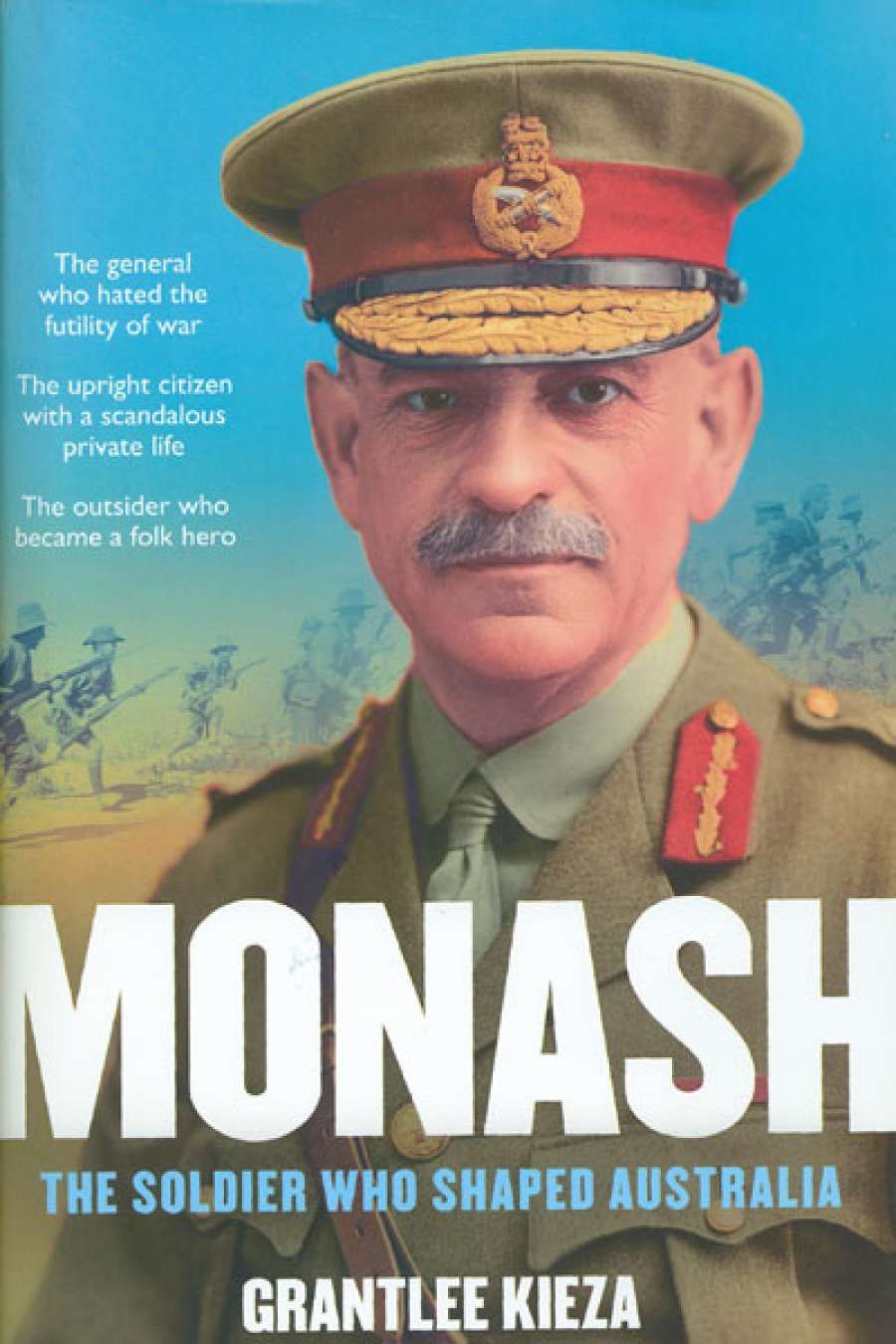
- Free Article: No
- Contents Category: Biography
- Custom Article Title: John Ramsland reviews 'Monash' by Grantlee Kieza and 'Maestro John Monash' by Tim Fischer
- Review Article: Yes
- Online Only: No
- Book 1 Title: Monash
- Book 1 Subtitle: The Soldier Who Shaped Australia
- Book 1 Biblio: ABC Books, $39.99 hb, 713 pp, 9780733333538
- Book 2 Title: Maestro John Monash
- Book 2 Subtitle: Australia's Greatest Citizen General
- Book 2 Biblio: Monash University Publishing, $29.95 pb, 300 pp, 9781922235596
Because of Messines, the stalemated front had been pushed back an extraordinary two miles; 17,300 bewildered prisoners were taken and the Germans suffered about 20,000 casualties. Monash was now considered articulate, cultured, and wise by those in high command. He was regarded as cautious, but not overly so – a planner with imagination and verve. More importantly, he gained the confidence of the Australians under him who recognised his decisiveness and sure judgement. Monash learnt much from Plummer's mentorship and from that point on pursued a brilliant path in 1918, achieving victories at Le Hamel, Villers-Bretonneux, Amiens, Péronne, and on the Hindenburg Line. He thus acquired a legendary reputation.
To write about a celebrated figure is a difficult task; in this case it is under intense scrutiny from military buffs, who demand factual accuracy. Then there are the usual criticisms from academic historians. Kieza fares well against such pressures, despite some journalistic and melodramatic touches created by placing every verb in every sentence in the present tense (the past, in my opinion, is best framed in the past). Kieza, drawing on comprehensive archival research, equals rather than surpasses Geoffrey Serle's majestic and elegant Monash: A Biography (1982).
To achieve their large tomes, Kieza and Serle – unlike earlier biographies, such as A.J. Smithers's excellent study (1973) – had full access to the vast collection of Monash's private papers and to the wealth of literature since the early 1970s. No one could have wished for such a complete set of sources from which to write a detailed biography.
 John Monash with Major JP McGlinn in Egypt, 1915
John Monash with Major JP McGlinn in Egypt, 1915
'He was brilliantly innovative at manipulating the modern industrial weapons of war and by taking judicious departures from traditional military norms'
Kieza is insightful in dealing with Monash's Jewish childhood, early formation, and schooling. Monash's mother ensured that her only son had an élite classical Australian education that turned him into an outstanding scholar and a Melburnian upper-middle-class gentleman. He was inculcated with the ideas, values, and culture of Classical Greece and Rome and the British–Australian concept of political liberty, individualism, and responsible citizenship in a new and rising colonial society. At Scots College, Melbourne, Calvinistic values of hard work and intellectual development were readily absorbed. Monash was an eager, able student. Born in East Melbourne to immigrant German-speaking parents of modest means, he became confidently Australian – full of social ability and patriotism towards the British Empire. His early relationship with William Elliott, his schoolmaster at Jerilderie, was crucial in his intellectual development, self-confidence, and determination to become great.
The complexities of Monash's personality, fully explored by Kieza, reveal the reasons for his success in law advocacy, civil engineering, and innovative military leadership. Kieza leaves few relevant documents untouched. Sometimes they overwhelm him, as in the case of Monash's many love letters to mistresses. Kieza exhaustively explores these in an attempt to define Monash's keen interest in women of his own class and intellect.
 Monash by John Longstaff, 1919
Monash by John Longstaff, 1919
Tim Fischer's Maestro John Monash is in a lighter vein and, although this is not acknowledged in the Bibliography, depends largely on paraphrasing the established literature, particularly Serle's biography and Monash's own works of 1920, The Australian Victories in France in 1918 (war propaganda, but close to the truth). Fischer lacks Monash's literary style but is competent in describing set battle pieces and their like. Unfortunately, he interprets events through the blurred lens of his own political and sectarian bias. He supports Monash's posthumous elevation to field marshal. His leitmotiv, like that of Kieza, is to raise the spectre of nasty anti-Semitic treatment of Monash by the influential war journalists Charles Bean and Keith Murdoch, as well as by Prime Minister Billy Hughes. (Rumours about Monash being a spy were wildly circulated in polite Melbourne society.)
Kieza does a convincing job in identifying primary evidence in contemporary correspondence. He has effectively exposed the conspiracy led by Bean in opposing Monash's appointment as commander of the Australian Corps during the 1918 German Spring Offensive. Fortunately, Hughes interviewed the fighting Divisional leaders under Monash. All were loyal to him. Not one believed he should not be in charge. Haig and other high-ranking British officers also supported Monash's appointment. His brilliant success in ninety-three minutes at Le Hamel scotched the conspiracy.
Kieza provides a well-developed detailed study of Monash's business struggles and achievements and his troubled marriage to Hannah Victoria Moss. He is particularly sensitive in describing Monash's declining years, his love of family, especially his grandchildren, his marked ability as a teacher, his enjoyment of bushwalking and theatre-going, and his profound legacy to Australian society in the first part of the twentieth century.


Comments powered by CComment